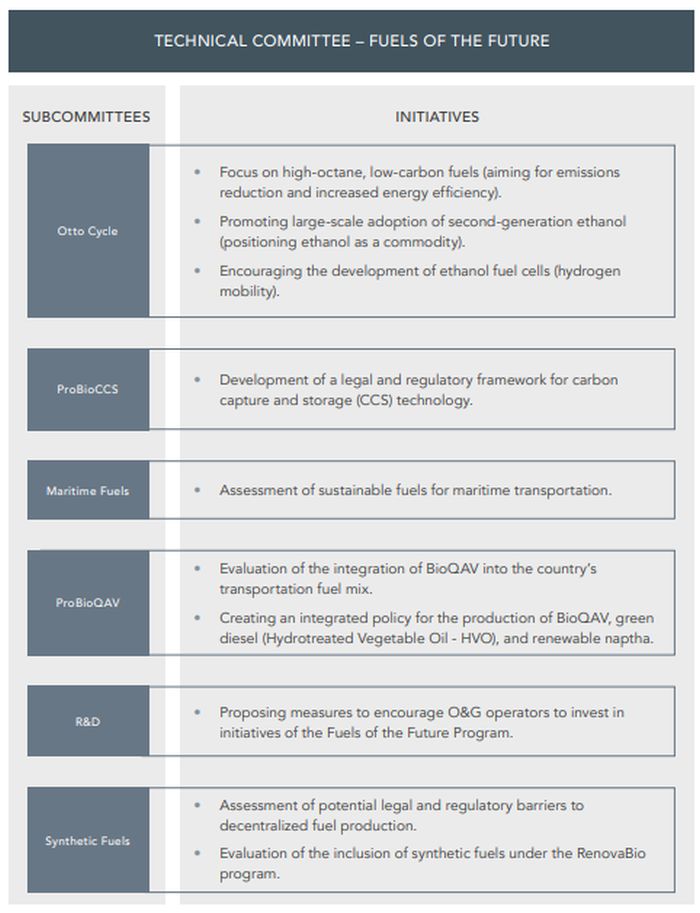- with readers working within the Oil & Gas industries
- within Wealth Management and Intellectual Property topic(s)
INTRODUCTION
On October 09, 2024, Law No. 14.993/2024 (the Fuel of the Future Law) was published in the Official Gazette. The Fuel of the Future Law addresses several topics such as sustainable low-carbon mobility and the capture and geological storage of carbon dioxide, and provides for different programs, including the National Program for Sustainable Aviation Fuel (ProBioQAV), the National Green Diesel Program (PNDV), and the National Program for Decarbonizing Natural Gas Producers and Importers and for Incentives to Biomethane.
BACKGROUND
Despite the significant market share and use of biofuels in the energy mix in Brazil, the transportation sector is still responsible for a significant share of greenhouse gas (GHG) emissions, indicating the need for a joint approach and to integrate existing government programs, such as the National Biofuels Policy (RenovaBio) created in 2017, and the Vehicle Air Pollution Control Program (Proconve) created in 1986.
In this context, Brazil's National Energy Policy Council (CNPE) created the Fuel of the Future Program by means of CNPE Resolution No. 07/2021, resulting in the publication of the Fuel of the Future Law.
The Fuel of the Future Program was conceived with the goal of harmonizing Brazil's GHG mitigation policies, in order to increase the use of sustainable and low-carbon fuels, decarbonize the energy mix used for transportation and increase the energy efficiency of vehicles. The program keeps with the 2021 identification of Brazil as the leading country in the "Energy Transition" category at the United Nations' HighLevel Dialogue on Energy
The Fuel of the Future Technical Committee (CT-CF) was established and appointed to carry out necessary studies and propose measures to increase the use of sustainable fuels in all means of transportation.
THE CT-CF AIMS TO PROPOSE:
- Measures for integration between RenovaBio, Proconve, the National Program for the Production and Use of Biodiesel (PNPB), the Rota 2030 Program, the Brazilian Vehicle Labeling Program (PBE Veicular), and the National Program for the Rationalization of the Use of Petroleum Derivatives and Natural Gas (CONPET), among others;
- Measures to improve fuel quality, reduce the average carbon intensity of the fuel matrix and transport emissions, and increase energy efficiency;
- A methodology for evaluating the entire supply chain (well-to-wheel) in order to evaluate emissions from various modes of transportation, including emissions associated with the manufacture of vehicles;
- A methodology for evaluating the entire supply chain (well-to-wheel) in order to evaluate emissions from various means of transportation, including emissions associated with the manufacture of vehicles;
- Studies to evaluate the possibility of bringing the reference fuels closer to the fuels actually used, taking into account the maintenance of the deadlines established by Proconve;
- Studies to expand the use of sustainable and low-carbon fuels.
The CT-CF was composed of representatives of 15 government entities:
- Ministry of Mines and Energy (MME), which serves as the CT-CF's coordinator;
- Civil Office of the Presidency of the Republic;
- Ministry of the Economy;
- Ministry of the Environment (MMA);
- Ministry of Infrastructure (MINFRA);
- Ministry of Agriculture, Livestock and Supply (MAPA);
- Ministry of Foreign Affairs (MRE);
- Ministry of Science, Technology and Innovation (MCTI);
- Ministry of Regional Development (MDR);
- Brazilian Navy;
- National Agency of Petroleum, Natural Gas and Biofuels (ANP);
- National Civil Aviation Agency (ANAC);
- Energy Research Company (EPE);
- Brazilian Institute of the Environment and Renewable Resources (IBAMA); and
- National Institute of Metrology, Quality and Technology (INMETRO).
Due to the diversity and complexity of the objectives determined by the CNPE in 2021, the CT-CF established technical subcommittees, eminently technical bodies comprised of government, industry and academic representatives.

THE FUEL OF THE FUTURE LAW
The Fuel of the Future Law was discussed under Bill of Law No. 528/2020. After being approved by the House of Representatives and the Senate, the text was passed by the President of the Republic in October 8, 2024.
The law does not outline specific treatment for aviation, maritime and road fuels, allowing each sector to adopt different decarbonization methods suitable for the industry
Below are the main aspects of the Fuel of the Future Law:
INTEGRATION
The initiatives and measures adopted within the scope of RenovaBio, the Mover Program, PBEV and Proconve must occur in an integrated manner, in order to promote sustainable low-carbon mobility. The integration between RenovaBio, the Mover Program and PBEV will be carried out by adopting the life cycle analysis methodologies below with the aim of mitigating CO2e emissions with better cost-benefit:
UNTIL DECEMBER, 2031: WELL-TO-WHEEL CYCLE
Accounts for GHG emissions from the processes of cultivating and extracting resources and the production of liquid or gaseous fuels or electrical energy and their distribution and use in light and heavy passenger and commercial vehicles.
AS OF JANUARY, 2032: CRADLE-TO-GRAVE CYCLE
Accounts for GHG emissions incorporated into the well-to-wheel cycle, plus those generated from the extraction of resources and the manufacture of auto parts, as well as the assembly and disposal of light and heavy passenger and commercial vehicles.
NATIONAL GREEN DIESEL PROGRAM
The Fuel of the Future Law establishes the ProBioQAV, to encourage the production and use of Sustainable Aviation Fuel (SAF). This program requires airline operators to gradually reduce carbon dioxide emissions, starting with a 1% annual reduction beginning in January 2027, and reaching a 10% reduction by January 2037. This reduction is expected to be achieved by increasing the percentage of SAF blended with fossil aviation kerosene, although alternate means to meet the targets may be used.
The ANAC will be responsible for defining a method to verify if the targeted reductions are achieved, as well as for inspecting air operators. Compliance with the targeted reductions may be waived for air operators (i) with annual carbon dioxide emissions lower than the amount defined by ANAC; or (ii) without access to SAF at their respective airports.
Moreover, obligations imposed by foreign countries to national air operators relating to the use of SAF may be extended to international flights passing through the national territory, based on the principle of reciprocity, upon determination by the CNPE and regulation by ANAC.
NATIONAL GREEN DIESEL PROGRAM
The Fuel of the Future Law also creates the National Green Diesel Program (PNDV), as part of the effort toward energy transition and the reduction of external dependence on petroleum-based diesel, by gradually incorporating green diesel into the country's fuel matrix.
To define the mandatory percentage of addition to fossil diesel, the CNPE will evaluate the product's supply conditions, including the availability of raw materials, capacity and location. CNPE must also consider the impact of the mandatory minimum addition on the price to the end consumer and the competitiveness of domestically produced green diesel on international markets.
To view the full article click here
Visit us at mayerbrown.com
Mayer Brown is a global services provider comprising associated legal practices that are separate entities, including Mayer Brown LLP (Illinois, USA), Mayer Brown International LLP (England & Wales), Mayer Brown (a Hong Kong partnership) and Tauil & Chequer Advogados (a Brazilian law partnership) and non-legal service providers, which provide consultancy services (collectively, the "Mayer Brown Practices"). The Mayer Brown Practices are established in various jurisdictions and may be a legal person or a partnership. PK Wong & Nair LLC ("PKWN") is the constituent Singapore law practice of our licensed joint law venture in Singapore, Mayer Brown PK Wong & Nair Pte. Ltd. Details of the individual Mayer Brown Practices and PKWN can be found in the Legal Notices section of our website. "Mayer Brown" and the Mayer Brown logo are the trademarks of Mayer Brown.
© Copyright 2024. The Mayer Brown Practices. All rights reserved.
This Mayer Brown article provides information and comments on legal issues and developments of interest. The foregoing is not a comprehensive treatment of the subject matter covered and is not intended to provide legal advice. Readers should seek specific legal advice before taking any action with respect to the matters discussed herein.
[View Source]





